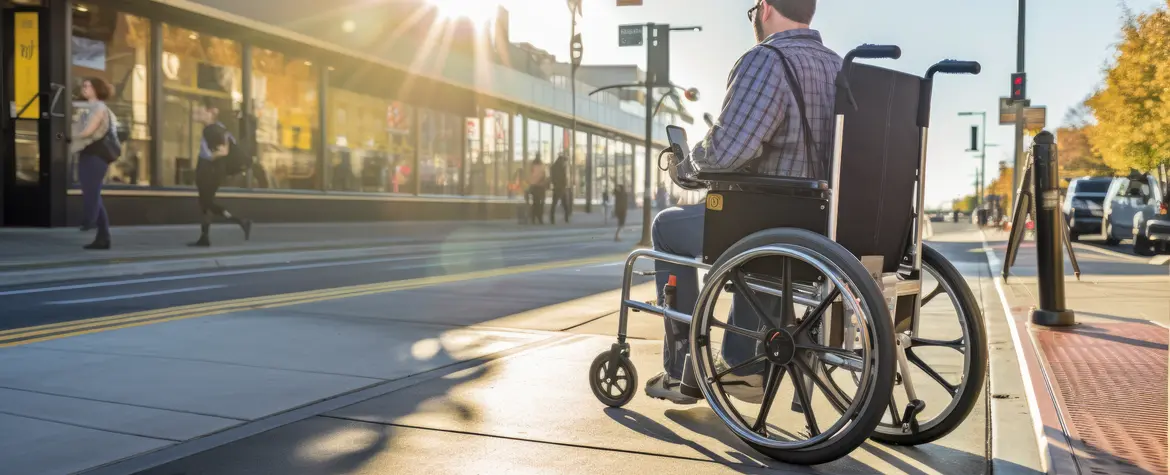Mobility, community participation, and health of persons with disabilities in Switzerland: a national mixed-method study (MOBILE)

Description
Background and Rationale
Persons with disabilities face inequalities in their everyday life due to the inability to participate in community activities and access places. Many of these inequalities are based on environmental restrictions. Mobility is an important prerequisite of community participation and health of persons with and without disabilities. However, there are no studies that examine, in combination, the community participation of persons with disabilities in relation to mobility and health, their satisfaction with community participation, and how this compares to the situation of persons without disabilities. Furthermore, mobility services are often not available and/or accessible for all and are a barrier to community participation. The political goals to adapt public transport services, structures, and vehicles until the end of the year 2023 to provide access for all persons was not reached in Switzerland. Thus, there is a societal need and interest to develop policy recommendations to increase the elimination of discrimination of persons with disabilities.
Objective
The overall objective of this project is to provide evidence and recommendations about mobility, community participation, and health of persons with and without disabilities in Switzerland. Specifically, we aim to: a) identify if persons with disabilities have a lower frequency of visiting important places and a lower variety of transportation modes used than persons without disabilities; b) identify if persons with disabilities have a lower degree of self-rated community participation, of self-rated satisfaction with community participation, and self-rated quality of life than persons without disabilities; c) examine if self-rated degree of and satisfaction with community participation of persons with and without disabilities is associated with frequencies of visiting important places and modes of transportation; d) explore and describe the meaning community participation and visiting important places has for persons with disabilities; e) explain affordances/facilitators and barriers that hinder or support visiting important places for community participation; f) give a voice to persons with disabilities regarding their transportation/mobility needs; g) inform the development and validation of policy recommendations and tailor them to the Swiss federal context to increase persons with disabilities community participation in relation to their needs.
Methods
We use a mixed method-design in this project, implementing qualitative and quantitative studies. Participants for the studies are persons 1) 18 years of age and above, 2) with disabilities and/or chronic conditions; 3) who need, want and/or are expected to participate in the community by being mobile and using transportation, and 4) who agree to participate in the study. The study takes place in the German, French, and Italian speaking parts of Switzerland. We will collect data using qualitative and quantitative methods, such as narrative interviews, photovoice, and nationwide surveys using the Participation in Activities Outside Home (ACT-OUT) questionnaire, the European Quality of Life and Health measure (EuroQoL-5D), and other questionnaires focusing on mobility of persons with disabilities. Data analysis is implemented according to the various qualitative and quantitative study designs and depending on the type and distribution of data.
Expected Results and Impact
We expect multiple impacts from the project, such as more knowledge on the needs of persons with disabilities regarding mobility, community participation, and health. In addition, the identified barriers and facilitators will provide a better insight into the modifications that need to be implemented in the environment. Lastly, the policy recommendations will be the basis to reduce environmental barriers and to increase accessibility for all.
Key data
Projectlead
Deputy Projectlead
Co-Projectlead
Prof. Dr. Isabel Margot-Cattin (Haute école spécialisée de Suisse occidentale HES-SO)
Project team
Sara Frey, Prof. Dr. Staffan Josephsson (Karolinska Institutet), Dr. Sarah Mantwill (Universität Luzern), Clémence Orain (Haute école spécialisée de Suisse occidentale HES-SO), Prof. Dr. Ann-Helen Patomella (Karolinska Institutet)
Project partners
Haute école spécialisée de Suisse occidentale HES-SO; Karolinska Institutet; Universität Luzern; Schweizerische Bundesbahnen SBB; Pro Infirmis; BETAX Genossenschaft; Association Transport Handicap Vaud; Sensability; Stiftung Behindertentransport Kanton Bern; Fussverkehr Schweiz
Project status
ongoing, started 02/2024
Institute/Centre
Institute of Occupational Therapy (IER)
Funding partner
Health Research and Wellbeing at UAS and UTE / Projekt Nr. 220493
Further documents and links
- Equal Mobility Through Paratransit Services?
- Building Opportunities for Participation and Accessbility through liefelong community Mobility (BOPALiM)
- Cognitive assessment of fitness to drive: Recommendations for Switzerland
- Project database ZHAW; What influence does mobility have on community participation and health of persons with disabilities? This project investigates the meaning of mobility?
- Project Website HES-SO
